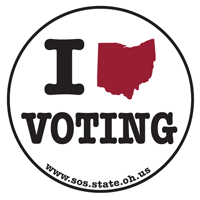New laws mean voting changes for Ohio 2014 elections

By Maggie Thurber | for Ohio Watchdog
GOLDEN WEEK: Ohioans won’t be able to register and vote at the same time from now on, thanks to a change in state law.
Three new laws mean Ohio voters will see changes when casting ballots in 2014, including the elimination of the so-called “golden week” that allowed people to register and vote at the same time.
Despite opposition to the bills during their consideration in the General Assembly and a federal lawsuit, Secretary of State Jon Husted says, “Ohio is one of the easiest states to vote in the nation.”
Because of Senate Bill 238, absentee voting will begin the day after voter registration closes, Oct. 7 for this year’s November election.
Previously, absentee voting began 35 days prior to the election, but Ohio law requires voters to register 30 days before the election. This resulted in a “golden week” — five days during which people could register and then immediately vote. SB 238 eliminated the overlap.
Additionally, based on recommendations from the Ohio Association of Election Officials, all counties will follow a uniform absentee voting schedule that allows for four weeks of early voting. The schedule includes two Saturdays.
On May 1, the American Civil Liberties Union filed a federal lawsuit seeking to overturn the directive setting the uniform early voting hours and the elimination of the golden week.
The suit, filed on behalf of the Ohio Conference of the NAACP, the League of Women Voters of Ohio and several African-American churches, claims the directive and the law violate the Voting Rights Act and the U.S. Constitution by disenfranchising voters, especially minorities.
But a news release from Husted notes Ohio’s early voting schedule “is well above the national average of 19 days and offers Ohioans significantly more opportunity to vote than many surrounding states which do not offer any forms of early voting.”
The case is scheduled for a preliminary pretrial conference before Magistrate Judge Norah McCann King in July.
Voters may also see fewer unsolicited applications for absentee ballots thanks to Senate Bill 205, which allows only the secretary of state to send out such mailings — and, after 2014, only if the General Assembly has appropriated money to do so. All other public officials, employees and public offices are prohibited from doing so.
Before 2012, when the secretary of state’s office first mailed absentee ballot requests to every Ohio voter, only certain counties would send out unsolicited application forms. The bill ensures equal opportunity for voters to request absentee ballots.
Husted said he intends to seek funding to continue this practice in even-numbered years for the November general election.
But SB 205 may cost voters a bit more, because the bill also prohibits a board of elections from prepaying the return postage for any application or any absentee ballots.
The bill also grants a voters an opportunity to correct incomplete or insufficient information on the absentee ballot that may cause it to be rejected.
Existing law says ballots must be rejected if the voter information is incomplete or insufficient. This bill requires a board of elections to contact the absentee voter by mail and grants seven days during which the voter can provide the accurate or complete information.
Provisional ballots are also getting a makeover.
A provisional ballot is used on Election Day when the voter-provided information doesn’t match the data on file, or when a voter has requested an absentee ballot. The purpose of the provisional ballot is to allow the vote to be cast, but give the elections board time to verify the information before counting it.
According to the secretary of state’s office, the most common reason for a provisional ballot is voters failed to update their address at least 30 days before the election.
Senate Bill 216 requires boards of elections to have a more user-friendly provisional ballot envelope form on which voters must provide five key pieces of information. Voters who don’t provide the proper identification on Election Day will have seven days in which to do so to have their vote count.
SB 216 also addresses the issue of the wrong precinct but the right polling location by requiring booth officials to complete a form stating the correct precinct and verifying the voter was directed to the correct precinct.
If the booth official doesn’t direct the voter to the proper precinct and complete the form, the law requires the ballot be remade and counted for each office, question and issue for which the individual was eligible and attempted to vote.
Husted and local boards of elections plan various educational efforts between now and October to ensure voters understand the changes in the law.
“We will continue to make Ohio a state where it is both easy to vote and hard to cheat,” Husted said.
You can reach Maggie Thurber via email at maggie@ohiowatchdog.org







